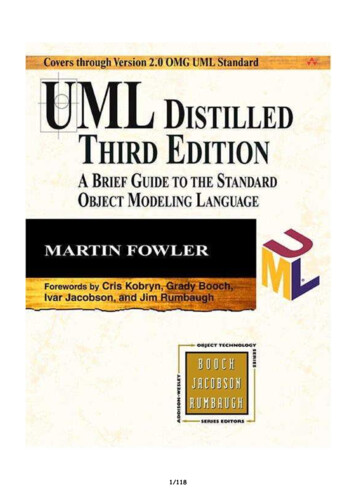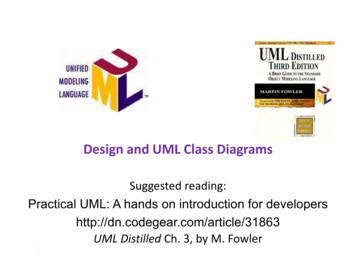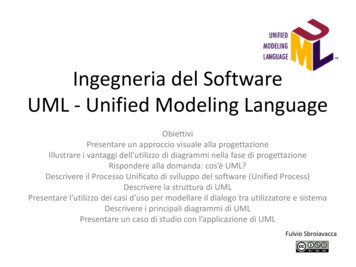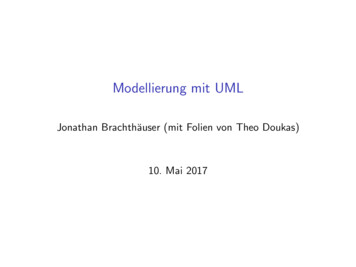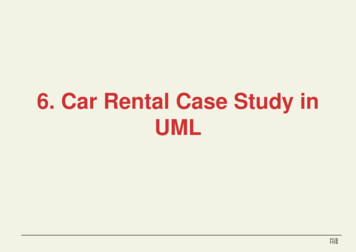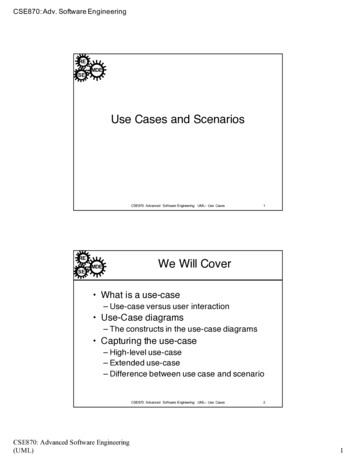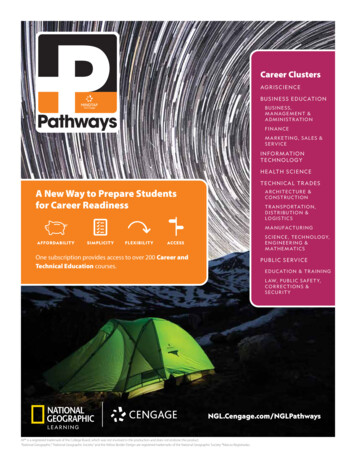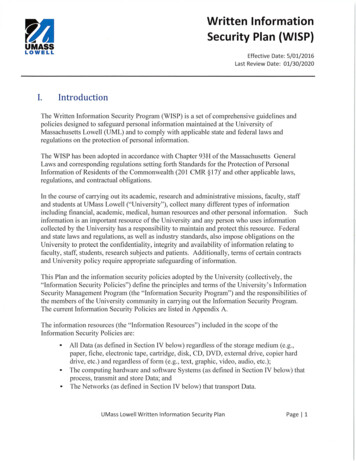
Transcription
Written Information SecurityPlan (WISP)Effective Date: 5/01/2016 Last ReviewDate: 01/30/2020IntroductionThe Written Information Security Program (WISP) is a set of comprehensive guidelines and policies designed to safeguardpersonal information maintained at the University of Massachusetts Lowell (UML) and to comply with applicablestate and federal laws and regulations on the protection of personal information.The WISP has been adopted in accordance with Chapter 93H of the Massachusetts General Laws and correspondingregulations setting forth Standards for the Protection of Personal Information of Residents of theCommonwealth (201 CMR §17)' and other applicable laws, regulations, and contractual obligations.In the course of carrying out its academic, research and administrative missions, faculty, staff and studentsat UMass Lowell (“University”), collect many different types of information including financial,academic, medical, human resources and other personal information. Such information is animportant resource of the University and any person who uses information collected by the Universityhas a responsibility to maintain and protect this resource. Federal and state laws and regulations,as well as industry standards, also impose obligations on the University to protect the confidentiality,integrity and availability of information relating to faculty, staff, students, research subjectsand patients. Additionally, terms of certain contracts and University policy require appropriatesafeguarding of information.This Plan and the information security policies adopted by the University (collectively, the “InformationSecurity Policies ) define the principles and terms of the University’s Information SecurityManagement Program (the “Information Security Program ) and the responsibilities of themembers of the University community in carrying out the Information Security Program. The currentInformation Security Policies are listed in Appendix A.The information resources (the “Information Resources ) included in the scope of the Information SecurityPolicies are:All Data (as defined in Section IV below) regardless of the storage medium (e.g., paper, fiche,electronic tape, cartridge, disk, CD, DVD, external drive, copier hard drive, etc.) andregardless of form (e.g., text, graphic, video, audio, etc.); The computing hardware andsoftware Systems (as defined in Section IV below) that process, transmit and store Data;and The Networks (as defined in Section IV below) that transport Data.
The Information Security Policies are University-wide policies that apply to all individuals who access, use or control InformationResources at the University, including faculty, staff and students; as well as contractors, consultants and otheragents of the University and/or individuals authorized to access Information Resources by aftiliated institutions andorganizations.The WISP has been adopted in accordance with Chapter 93H of the Massachusetts General [Laws and correspondingregulations setting forth Standards for the Protection of Personal Information of Residents of theCommonwealth (201 CMR §17)" and other applicable laws, regulations, and contractual obligationsThe MissionThe mission of the Information Security Program is to protect the confidentiality, integrity and availabilityof Data. Confidentiality means that information is only accessible to authorized users. Integritymeans safeguarding the accuracy and completeness of Data and processing methods. Availabilitymeans ensuring that authorized users have access to Data and associated Information Resourceswhen required.This Plan establishes the various functions within the Information Security Program and authorizes the persons describedunder each function to carry out the terms of the Information Security Policies.The functions are:Executive ManagementExecutive Managers are senior University officials, including the Provosts, Deans, Vice Chancellors, Department Chairs,and Department Heads, who are responsible for overseeing information security for their respective areasof responsibility and ensuring compliance with all Information Security Policies. Such responsibilities include,but are not limited to:Ensuring that each System Owner and Data Owner in their respective areas of responsibility appropriatelyidentify and classify Data in accordance with the UMass Lowell Data Classification Policy;Ensuring that each such System Owner and Data Owner receives training on how to handle Sensitive Dataand Confidential Data; and Ensuring that each I'T Custodian/Administrator in his/her area of responsibilityprovide
periodic reports with respect to the inventory of Information Resources used in such area to theapplicable Information Security Office.Security, Policy and Compliance GovernanceThe following committees have been established to govern security, policy and compliance issuesrelating to the Information Security Program at the organizational level:Information Security Steering Committee UMass Lowell Policy Committee InformationSecurity Cabinet (UMass System-wide — advisory capacity)Security ManagementThe Chief Information Security Officer (CISO) is responsible for the management oversight of the InformationSecurity Program/Office. The Office is responsible for the day to day management of theInformation Security Program, including:Developing, documenting and disseminating the Information Security Policies; Educating andtraining University personnel in information security matters; Communicating information regardingthe Information Security Policies; Developing and executing the Information SecurityRisk Management Program; Translating the Information Security Policies into technicalrequirements, standards and procedures; Collaborating with Data Owners and SystemOwners to determine the appropriate means of using Information Resources.; and Authorizingany required exceptions to any Information Security Policy or any associated technicalstandards or procedures and reporting such exceptions to the Office of the General Counsel.In addition to the responsibilities listed above, the Executive Managers have granted the authorityto the Information Security Office to conduct the following activities:Monitoring communications and Data that use the University Network or Systemsfor transmission or storage; Monitoring use of the University’s InformationResources; Conducting vulnerability scanning of any Information Resourcesconnected to the University Network: Conducting security assessmentsof Systems, Server centers and Data centers:
Disconnecting Information Resources that present a security risk from the UniversityNetwork; Erasing all Data stored on personal Endpoints previously usedfor University business, as requested or required; and Leading and managingthe University Incident Response Team in connection with any breach orcompromise of Sensitive Data, to the extent provided for in the UMass Lowell ElectronicData Security Breach Reporting and Response PolicyData OwnershipData owners are University officials, including Directors, Officers of Instruction and Officers of Research,who are responsible for determining Data classifications, working with the applicable InformationSecurity Office in performing risk assessments and developing the appropriate proceduresto implement the Information Security Policies in their respective areas of responsibility.Such responsibilities include, but are not limited to:Appropriately identifying and classifying Data in their respective areas of responsibilitiesin accordance with the University of Massachusetts Lowell Data ClassificationPolicy ; Establishing and implementing security requirements for suchData in consultation with the applicable Information Security Office; Where possible,clearly labeling Sensitive Data and Confidential Data; Approving appropriateaccess to Data; and Ensuring that the UMass Lowell Sanitization andDisposal of Computer Resources Policy is followed.System OwnershipSystem owners are University officials, including Directors, System Administrators and Officers of Research, whoare responsible for determining computing needs, and applicable System hardware and software, in their respectiveareas of responsibility and ensuring the functionality of each such System. Such responsibilities include,but are not limited to:Classifying each System in their respective areas of responsibility based on the identification andclassification of Data by the applicable Data Owner; Ensuring that each such System thatcontains Sensitive Data or Confidential Data is scheduled for risk assessment in accordancewith the University of Massachusetts Lowell Information Security Risk ManagementPolicy Establishing and implementing security requirements for each such Systemin consultation with the Information Security Office;
Documenting and implementing audit mechanisms, timing of log reviews andlog retention periods; Maintaining an inventory of such Systems: Approvingappropriate access to such Systems; and Ensuring that the Universityof Massachusetts Lowell Sanitization and Disposal of ComputerResources Policy is followed.Technical OwnershipIT Custodians/Administrators are University personnel who are responsible for providing a secure infrastructurein support of Data, including, but not limited to, providing physical security, backup and recoveryprocesses, granting access privileges as authorized by Data Owners or System Owners andimplementing and administering controls over Data in their respective areas of responsibility. Suchresponsibilities include, but are not limited to:Maintaining an inventory of all Endpoints used in their respective areas of responsibility: Conductingperiodic security checks of Systems and Networks, including password checks, intheir respective areas of responsibility; Documenting and implementing audit mechanisms,timing of log reviews and log retention periods: Performing self-audits and reportingmetrics to the Information Security Office and monitoring assessments and appropriatecorrective actions: and Ensuring that the UMass Lowell Sanitization and Disposalof Information Resources Policy is followed.System or Data UsersUsers are persons who use Information Resources. Users are responsible for ensuring that such Resourcesare used properly in compliance with the University of Massachusetts Lowell AcceptableUse Policy; information is not made available to unauthorized persons and appropriate securitycontrols are in place.[V. Reporting Actual Breaches of SecurityIncidents that raise concerns about the privacy or security of Personal Information must be reported promptly upon discovery to the InformationSecurity Officer. The Incident Response Team (IRT) shall investigate all reported Security Incidents and Breaches. Led by theUML's Information Security Office, the IRT's objective is to:
Coordinate and oversee the response to Incidents in accordance with the requirements ofstate and federal laws and UML policy; Minimize the potential negative impact to the University,Client and 3rd Party as a result of such Incidents; Where appropriate, inform theaffected Client and 3rd Party of action that is recommended or required on their behalf;- Restore services to a normalized and secure state of operation; Provide clear andtimely communication to all interested parties.Employee TrainingUML privacy and information security program serves to educate UML workforce in maintaining compliancewithin their particular UML business function or activity, whether it be under research grantsor industry contracts' privacy and security requirements, MGL Ch. 93H - Identity Fraud Statute,the Health Insurance Portability and Accountability Act (HIPAA), or other related federal andstate laws and regulations regarding data privacy and information security.University of Massachusetts Lowell (UML) requires that employees are trained in the proper Mhandlingof sensitive data. All UML faculty, staff, contingent workers, contractors and students in itsschools, departments, centers and business units are required to complete privacy and informationsecurity training if their job entails the handling of sensitive data.VI. EnforcementViolations of the Information Security Policies may result in corrective actions which may include: (a)the immediate suspension of computer accounts and network access: (b) mandatory attendanceat additional training; ( ) a letter to the individual’s personnel or student file; (d) administrativeleave without pay: termination of employment or non-renewal of faculty appointment orstudent status; or (f) civil or criminal prosecution.Applicable Laws, Regulations and Industry StandardsThe federal and Massachusetts State laws and regulations and industry standards that are applicableto information security at the University are listed in Appendix B.
Approvals/James W. Packard, CISORevision Date05/01/2016 01/30/2020 Revised biRevision DescriptionV1.0 V1.1JWP JWP—updates
Appendix AUNIVERSITY OF MASSACHUSETTS LOWELLInformation SecurityAcceptable Usage PolicyBusiness Continuity and Disaster Recovery PolicyData Classification PolicyAwareness PolicyEmail Usa[nstitutional Review Board Security PolicyPassword PolicyMobile Device and Cellular Services PolicyCloud Computing PolicyInformation Security Incident Response PolicySanitization and Disposal of Information Resources Policy
Applicable Federal and State Laws and RegulationsFederalThe Digital Millennium Copyright Act http://www.copyright.gov/legislation/dmca.pdfThe Family Educational Rights and Privacy Act (FERPA) (20 U.S.C. § 1232g; 34 CFR Part 99) http://www.ed.gov/policThe Gramm-Leach-Bliley Act (Financial Services Modernization Act of 1999) http://www.ftc.gov/privacy/privacyinitiativThe Health Insurance Portability and Accountability Act (HIPAA) The Health Information Technologyfor Economic and Clinical Health Act (HITECH) 3-01073.pdfState of Massachusetts 201 CMR 17.00: Standards for the Protection of Personal ResidentsInformation ofof the Commonwealth reg.pdfIndustry StandardsPayment Card Industry/Data Security Standard https://www.pcisecuritystandards.org/tech/
Appendix CDefinitionsAs used in the Information Security Policies, the following terms are defined as follows:the Advanced Encryption Standard adopted by the U.S. government.Approved Email System: as defined in the University of Massachusetts Lowell Email PolicyUMass Lowell or the University: as defined in Section I of this Plan.Confidential Data: any information that 1s contractually protected as confidential information and any other informationthat is considered by the University appropriate for confidential treatment. See the University of MassachusettsLowell Data Classification Policy for examples of Confidential Data.Covered Entity: as defined in HIPAA (45 CFR 160.163).Data: all items of information that are created, used, stored or transmitted by the University communityfor the purpose of carrying out the institutional mission of teaching, research and clinicalcare and all data used in the execution of the University’s required business functions.Data Owner: as defined in Section (D) of this Plan.Email System: a System that transmits, stores and receives emails.Endpoint: any desktop or laptop computer (i.c., Windows, Mac, Linux/Unix), Mobile Device or otherportable device used to connect to the University wireless or wired Network, access UMassLowell email from any local or remote location or access any institutional (University, departmentalor individual) System either owned by the University or by an individual and used forUniversity purposes.FPHI:Electronic Personal Health Information.FERPA: Family Educational Rights and Privacy ActHIPAA: Health Insurance Portability and Accountability ActHITECH: Health Information Technologfor Economic and Clinical Health ActInternational Data Encryption Algorithm. Information Resources: as defined in
Section of this Plan. Information SecurityInternal Data: as defined in the University of Massachusetts Lowell Data Classification PolicyInternet Protocol.[T Custodian: as defined in Section III (F) of this Plan.Key Business System: as defined in the University of Massachusetts L.owell Business Continuityand Disaster Recovery Policy.Media Access Control.Mobile Device: a smart/cell phone (i.e., iPhone, Android, Windows phone), tablet (i.e., iPad, Nexus,Galaxy Tab and other Android based tablet) or USB/removable drive.Network: electronic Information Resources that arc implemented to permit the transport of Databetween interconnected endpoints. Network components may include routers, switches, hubs,cabling, telecommunications, VPNs and wireless access points.OHCA: an Organized Health Care Arrangement, which is an arrangement or relationship, recognizedin the HIPAA privacy rules, that allows two or more Covered Entities who participatein joint activities to share PHI about their patients in order to manage and benefit theirjoint operations.Payment Card: for purposes of PCI-DSS, any payment card/device that bears the logo of the foundingmembers of PCI SSC, which are American Express, Discover Financial Services, JCB International,MasterCard Worldwide and Visa, Inc.Payment card industryPCI-DSS: the PCI Data Security Standard produced by the PCI-SSC, which mandates compliancerequirements for enhancing the security of payment card data.PCI-SSC: the PCI Security Standards Council, which is an open global forum of payment brands,such as American Express, Discover Financial Services, JCB International, MasterCardWorldwide and Visa Inc, that are responsible for developing the PCI-DSS.Peer: a network participant that makes a portion of its resources, such as processing power, disk storage or networkbandwidth, directly available to other network participants, without the need for central coordination by Serversor stable hosts. Examples include KaZaa, BitTorrent, Limewire and Bearshare.Peer-to-Peer File Sharing Program: a program that allows any computer operating the programto share and make available files stored on the computer to any machine with
similar software and protocol.as defined in the University of Massachusetts Lowell Data Classification PolicyPII: as defined in the University of Massachusetts L.owell Data Classification PolicyPublic Data: as defined in the University of Massachusetts Lowell Data Classification PolicyRemovable Media: CDs, DVDs, USB flash drives, external hard drives, Zip disks, diskettes, tapes, smart cards, medicalinstrumentation devices and copiers.Risk Analysis: The process of identifying, estimating and prioritizing risks to organizational operations,assets and individuals. “Risk Assessment” is synonymous with “Risk Analysis”.Risk Management Program: andThe combined processes of Risk Analysis, Risk RemediationRisk Monitoring.Risk Monitoring: The process of maintaining ongoing awareness of an organization’s informationsccurity risks via the risk management program.Risk Remediation: The process of prioritizing, evaluating and implementing the appropriate risk-reducing securitycontrols and countermeasures recommended from the risk management process. “Risk Mitigation or “CorrectiveAction Planning” is synonymous with “Risk Remediation”.RSA: the Rivest-Shamir-Adleman Internet encryption and authentication system.Sensitive Data: any information protected by federal, state and local laws and regulations and industry standards,such as HIPAA, HITECH, FERPA, M.G.L. c93H, similar state laws and PCI-DSS. See the University ofMassachusetts Lowell Data Classification Policy for examples of Sensitive Data.Server: any computing device that provides computing services, such as Systems and Applications,to Endpoints over a Network.SMTP: Simple Mail Transfer Protocol, which is an internet transportation protocol designed to ensurethe reliable and efficient transfer of emails and is used by Email Systems to deliver messagesbetween email providers.SSL: the Secure Sockets Layer security protocol that encapsulates other network protocols in anencrypted tunnel.
Student Education Records: as defined in the University of Massachusetts Lowell Data Classification PolicySystem: Server based software that resides on a single Server or multiple Servers and is used for University purposes.“Application” or “Information System” is synonymous with “System”.System Owner: as defined in Section II1 of this Plan.UPS: Uninterruptible Power Supply.User:as defined 1n Section III(G) of this Plan.User ID: a User Identifier.VPN: Virtual Private Network.UMass Lowell Written Information Security PlanPage 13
Information Security Cabinet (UMass System-wide — advisory capacity) C. Security Management The Chief Information Security Officer (CISO) is responsible for the management oversight of the Information Security Pro


